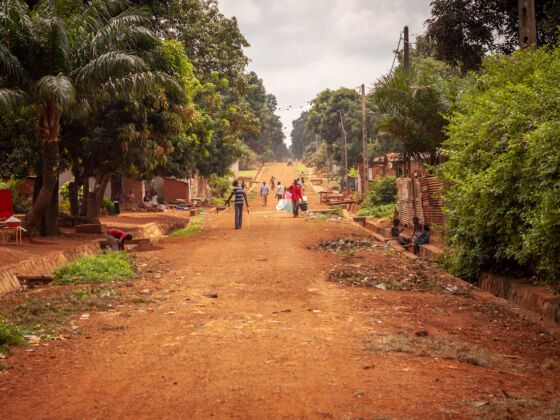You are asleep when the small plane touches down in Bangui at 8pm. You spent the whole flight mentally urging the pilot to beat the setting sun so you could catch that first glimpse of the Central African Republic out of an oval window, but you don’t. The sun sets and you’re so tired after the nearly 20-hour journey that you fall asleep in the moments between spotting the runway and feeling the wheels bounce against it.

You wake up standing in front of an immigration officer digging through your luggage, trying to explain that no, you don’t have a knife to cut open the zip tie, because that kind of thing isn’t usually allowed in airports these days, but all five years of your high school French will fail you as you say over and over again — in English — that you don’t understand. The immigration official gives up and sends you away without checking your bag. Mental note: Always use zip ties.
A group of very kindly locals begins carrying your luggage. By the time you break out of hibernation long enough to realize these are not the very kindly locals who were supposed to be picking you up, it’s too late. You throw dollars in their direction until you’ve negotiated the release of your luggage.
The 4×4 taking you to your hotel overtakes a tank filled with white faces: the French. Yes, you think, the first sign of the chaos you came here to write about. Then you pass streetside restaurants and hundreds of pedestrians taking evening strolls. Huh.
You check into the Hotel Ledger, because you’re a fucking idiot and looked for the nicest hotel in town and you die a little inside when the receptionist charges you $200 because he can’t find your reservation. But the room is big and the bed is bigger and when you wake up in the morning and look out at the team of polo-shirted, white-shorted men cleaning the pool, you think, “And this is the country Hollande said could be the next Somalia.”
You queue behind a couple as you wait for breakfast. The woman is in a tight dress, the man in a suit. They turn around and look at you in your cargo pants and checked scarf. There are about 12 other people in the restaurant, big enough to hold over a hundred. They all look like businesspeople. And you — you look like you stepped out of an Indiana Jones movie.
As you wait for your lift in the lobby, the 4x4s pull up, all with NGO markings, all offloading the next visitor to the next Somalia. Your translator, Hugues, arrives in pointed shoes and grey trousers and a collared shirt and a white tie. For the second time already today, you feel like a fucking tool.
The driver insinuates his way down roads that were once tarred, past Nissan dealerships and Total petrol stations, until you find a bank and a mobile company. Hugues spends most of this time explaining the difference between all the armed forces walking around. The Central African Armed Forces (Faca) wear red berets. The presidential guard wear green berets. The military police wear blue berets. The Mission for the Consolidation of Peace in Central African Republic (Micopax), wear green arm bands. They all wear camouflage. So do the rebels, Seleka, only they have no markings or decorations.
-
- “So that’s Faca?” you ask.
“No, that’s Seleka.”
“But he has medals on his uniform.”
“He is Seleka. I know.”
“How?”
“I know.”
At lunchtime, you find a riverside restaurant of plastic chairs and tables in a neighbourhood called Seoul. It’s hot, sticky, and suffocating. You’re sweating from the top of your arms, but it doesn’t evaporate. The air is already too thick with moisture.
Fishermen stand upright in their narrow canoes and pull in their nets. Boats ferry passengers across the Ubangi River to the Democratic Republic of Congo. You squint, trying to make out the refugee camp on the other side.
- “That’s where all the old ministers are,” says Hugues. “They fled there after the coup.”
A waitress brings a plastic bucket and liquid soap and a plastic kettle embossed with mosques to wash your hands. Over the next two weeks, you’ll see the same plastic mosque-decorated kettle at every restaurant in every town you visit. You’ll wonder which Chadian businessman made a killing importing them.
You order the local beer, Mocaf. It’s not cold, but it’s good. A breeze comes off the top of the river and your hands are deep in a dish of fish and plantain and children and rebels and shoppers and beggars walk past and you know the articles all said it was hell but right now Bangui’s treating you grand and you sit back, satisfied.
You spend the rest of your afternoon in briefings with NGOs and arrive back at the hotel that night in a daze of statistics. You sit next to your window and look out at the pool and write in your journal because that’s what you do on these trips. You mull over the stories of destroyed villages and murdered villagers, of the dozens killed in Bouca and the 30,000 displaced in Bossangoa. You struggle to reconcile it with the Bangui you shared your lunch with. The lit pool water glows blue and the guests clink cocktail glasses. Soft jazz plays in the corridor outside your door.
Tomorrow, you’re checking out.